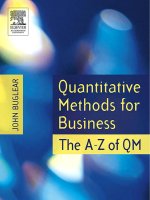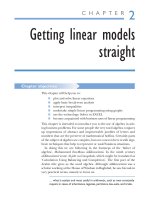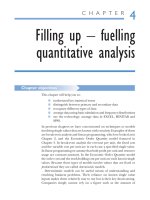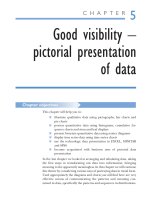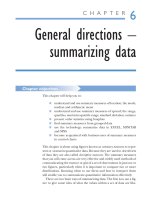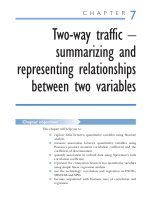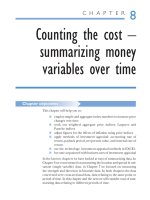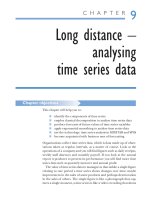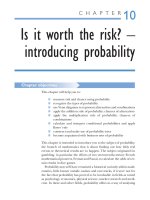Research methods for business students summary
Bạn đang xem bản rút gọn của tài liệu. Xem và tải ngay bản đầy đủ của tài liệu tại đây (1.94 MB, 97 trang )
Basic and applied research
Purpose of basic
research
Expand knowledge of
processes of business and
management
Results in universal
principles relating to the
process and its relationship
to outcomes
Findings of significance
and value to society in
general
Purpose of applied
research
Improve understanding of
particular business or
management problem
Results in solution to
problem
New knowledge limited to
problem
Findings of practical
relevance and value to
managers in organisations
The research process (A)
1.
2.
3.
4.
Wish to do research
Formulate and clarify your research
Critically review the literature
Choose your research approach and
strategy
5. Negotiate access and address ethical
issues
The research process (B)
6. Plan your data collection and collect the
data one or more of
Sampling
Secondary data
Observation
Semistructured and in-depth
Questionnaires
The research process ©
7. Analyse your data using one or both of:
Quantitative methods (based on numerical
data)
Qualitative methods (based on texts)
8. Write your project report and prepare
presentation
9. Submit your report and give your
presentation
Formulating and clarifying the research
topic - generating research ideas
Rational thinking
Examining your own
strengths and interests
Looking at past project
titles
Discussion
Searching the
literature
Creative thinking
Keeping a notebook of
ideas
Exploring personal
preferences using past
projects
Relevance trees
Brainstorms
Turning research ideas into
research projects
Writing research questions
One general focus research question
Several detailed questions
Writing research objectives
Are likely to lead to greater specificity than research
questions
Theory for writing research questions and
objectives
between two or more variables, which may or may not
Categories of knowledge
Descriptive knowledge
Answer what-questions
Intelligence gathering of facts
Explanatory knowledge
Answer why-questions (explanations,
relationships, comparisons, predictions,
generalisations)
Normative knowledge
Answer how-questions
Telling us about use, norms etc
The content of the research proposal
Title
Background
Research questions and objectives
Method
Timescale
Target date, task to be achieved
Gantt chart
Resources
References
Examining different types of
scientific documents
A scientific journal
A research report
A consultant report
A popular textbook
These documents will be separated at
least concerning level of language, public
and the structure.
Development of hypotheses
Hypotheses development is formulation of
testable expressions.
Hypotheses logically developed relations
between two or more variables expressed
in a form of testable expression.
If relations that has been theoretisized can
hold to be true?
Language stringency means
distinct definitions
Language use definition: Points out a
common use of language, for example a
dictionary
Stipulative definition: Suggests a new
word or points out that a certain word have
to be interpreted in a certain way in a
certain context.
Essence definition: To catch the essence
of a phenomenon. Ex. A human being is a
sensible animal.
Ostensive definition: Points out a phenomenon
with a charateristic/typical example. OBS. This
does not give a total explanation.
Operational definition: Explain a phenomenon
by giving a method or operation how to decide if
an expression is applicable or not. Ex. To have
the temperature T means to be able to use and
read a thermometer.
Reasons for reviewing the literature
It helps you to generate and refine your research
ideas.
A critical review is a part of the research project.
It tells you about the current state of knowledge
in your subject, its limitations, and how your
research fits in a wider context.
Establish what has been published in your area
Identify research that might currently be in progress.
The literature research process
Research questions and objectives
Define parameters of interest
Generate and refine keywords
Conduct search
Obtain literature
Read and evaluate the literature
Record the ideas and start drafting the
review
The content of the critical review
To include the key academic theories
within your chosen area of research
To demonstrate that your knowledge of
your chosen area is up to date
Through clear referencing, enable those
reading your project report to find the
original publications you cite
Fully acknowledging the research of
others
Literature sources (A)
Primary literature sources
Ex reports, theses, emails, conference
proceedings, planning documents
Often detailed
Are increasingly more available, often via the
web
Literature sources (B)
Secondary literature sources
Subsequent publication of primary literature
Ex. Journals (also known as periodicals, serials and
magazines)
Refereed academic jornals are evaluated by
experienced academic peers prior publication
Professional journals are produced for their members
by organisations (sometimes risk for bias)
Books and monographs written for specifik
audiences; often presented in a more ordered manner
than in journals. But be cautious; books may contain
out-of-date material even by the time they are
published
Literature sources (C)
Tertiary literature sources
Also called search tools, are devloped to
support to locate primary and secondary
literature
Ex. Indexes, abstracts, catalogues,
encyclopaedias, dictionaries, bibliographies
etc
Nowadays often the format is internet
Research approaches
Deductive approach
Develop a theoretical or conceptual
framework
Testing by using data
Inductive approach
Do not start with pretermined theories or
conceptual framework
Explore your data and develop theories from
them that you will subsequently relate to the
literature
Deductive and inductive research
Deduction
emphasises
Scientific principles
From theory to data
Explain relations
Collect quantitative
data
Operationalisations of
concepts
Generalisations to
conlusions
Induction emphasises
Meanings of humans
actions
Understanding of
research context
Collect qualitative data
Flexible research
structure
The researcher as one
part of the research
Less concern with
generalisations
Research approaches
The research onion
Epistemology
Knowledge theory or epistemologi is the
learning about knowledge
The word epistemologi comes from greece
episteme
logia
"learn", of logos
Concerns what constitutes acceptable
knowledge in a field study.
the positivist
perspective
the interpretivist
perspective
Positivism
Positivism (fr. positivisme), the name of
philosophical approaches that are
concerned with facts rather than
impressions, i. e. knowledge based on
Henri de Saint-Simon, but the school was
primarily developed by the 1800-sociologist
August Comte.
Natural science is the ideal with law-like
generalisations.
Realism
Epistemological position which relates to
scientific enquiry.
What the senses show us as reality is the truth;
existence independant of the mind.
Like positivism underpins the collection of data and
the understanding of data.
Two directions of realism:
Direct realism; what you see is what you get.
Critical realism; we experience sensations, the
images of the things in the world; not the things in
itself.
